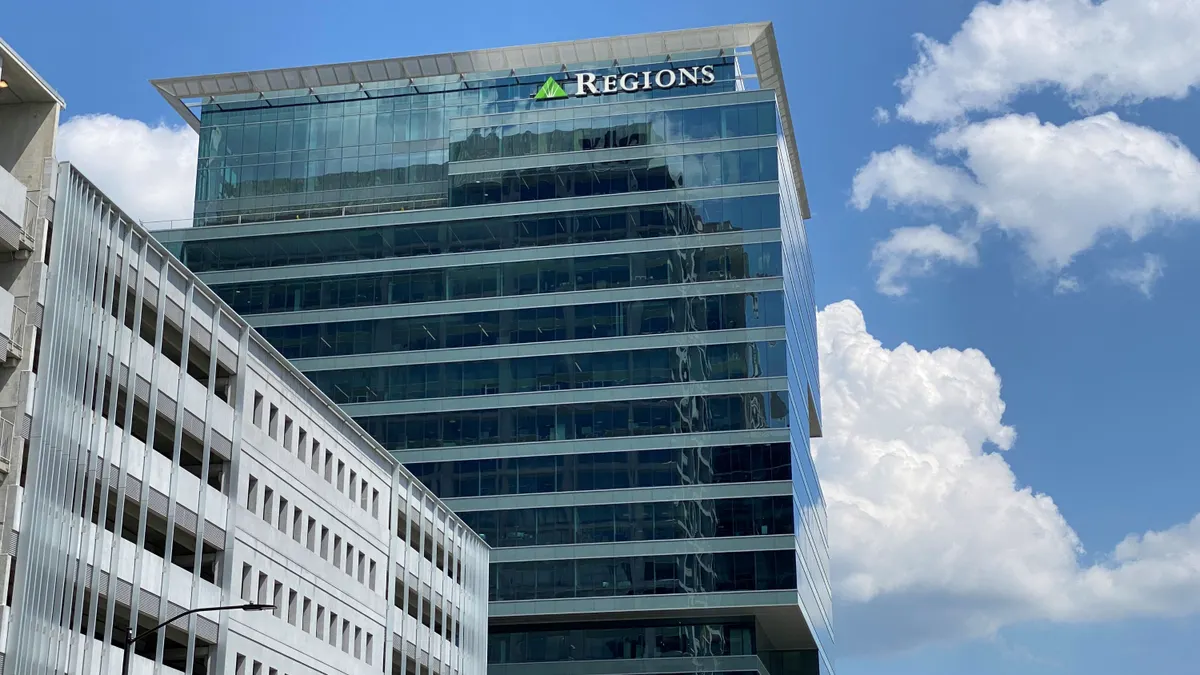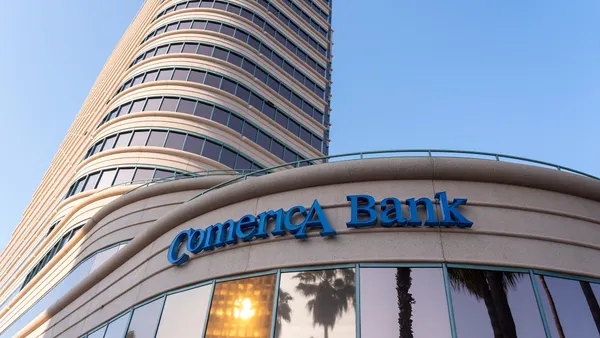Dive Brief:
- As bank merger and acquisition activity occurs within Regions Bank’s markets, “we are going to be part of taking advantage of the disruption,” CFO David Turner emphasized Tuesday at a Morgan Stanley conference.
- “If there’s M&A in our markets, that creates a lot of disruption,” David Turner said. If “somebody is going to do a deal where we are, then we're going to be all over customers and people and trying to grow our business that way as well.”
- For its part, Regions isn’t interested in acquiring a bank, but does remain open to nonbank M&A, executives at the Birmingham, Alabama-based regional lender said.
Dive Insight:
Regions CEO John Turner said Tuesday depository M&A “is not in our future,” as the $160 billion-asset lender favors organic growth instead. Acquisitions “can be very disruptive,” he added.
His comments echoed those from a March conference appearance, when he referred to M&A as “distracting” and “hard to do.”
Bank competition has intensified in the Southeast – where Regions asserted it has a “home field advantage” – as more people and businesses move to the area. Organic expansion in the Southeast has been a target for the likes of Fifth Third, Huntington and PNC. Top banks JPMorgan Chase, Bank of America and Wells Fargo have rejuvenated or opened a slew of new branches in the region.
Gunjan Kedia, now U.S. Bank’s CEO, said last September the bank would like to acquire a southeastern lender at some point to propel growth, although the bank later walked back those comments, stressing it’s not interested in bank M&A.
Exploiting the opportunity that arises when one bank acquires and integrates another is something one analyst flagged in a recent note. The SunTrust and BB&T merger of equals that resulted in Truist “created a share gain opportunity for both bigger and smaller banks in the region during the integration years,” Truist Securities analyst John McDonald wrote last week.
“If industry M&A picks up across the SE over the next year, as we expect, the benefits could accrue to potential buyers, sellers, and banks on the sidelines,” in part through “the opportunity to seek share of customers and capitalize on the temporary distraction of competitors going through the merger and integration process,” he wrote.
Bank M&A was widely expected to jump this year, as long-term industry trends lead to consolidation and regulators with more favorable attitudes toward mergers and acquisitions take charge.
But tariff uncertainty and related market volatility have stymied deal activity to some extent thus far this year. Year-over-year U.S. bank M&A activity has been flat, according to S&P Global Market Intelligence data. May saw 10 deal announcements, bringing the year’s total thus far to 56, equal to the number announced during the first five months of 2024, the firm said Tuesday.
Some of the Southeastern M&A activity within that total: Florida’s Seacoast Banking Corp. acquiring Villages Bancorporation; Nashville, Tennessee-based FB Financial Corp. acquiring Anniston, Alabama-based Southern States; Suffolk, Virginia-based TowneBank scooping up in-state peer Old Point Financial; and Doraville, Georgia-based MetroCity Bank acquiring neighboring First IC Bank.
As other lenders eye acquisitions, Regions is “laser-focused on growing households, growing operating accounts, participating in the growth in our markets,” Kate Danella, head of consumer banking, said at the conference Tuesday.
“We don't need to de novo in a net new market because our markets are growing,” so the bank aims to optimize its existing footprint, she said.
It’ll need to defend its turf, too: About 86% of Region’s deposits reside in Alabama, Tennessee, Florida, Louisiana, Mississippi, Georgia and Arkansas, according to a presentation.
Meanwhile, JPMorgan Chase plans to triple its branch count in Alabama over the next five years, and BofA is opening branches in Alabama and Louisiana in the coming years. And small and midcap banks are gaining share in high-growth metro areas within their footprints, such as Pinnacle in Charlotte, North Carolina; First Horizon in Birmingham; Synovus in Atlanta; and SouthState in Charleston, South Carolina, McDonald said in his note.
Nonbank M&A opportunities, however, do appeal to Regions, and the bank will continue to scour for those, although they have “been harder to find over the last 2 or 3 years as others have been interested as well,” John Turner said Tuesday. In 2021, Regions acquired commercial real estate lender Sabal Capital Partners.
As for the types of targets the bank might pursue, John Turner said Regions continues to look for mortgage servicing acquisition opportunities, and “may or may not want to add some capabilities within wealth management.” He noted, though, the latter tend to be “people-centric,” expensive and hard to find.
The bank has most of the capital markets capabilities executives would like, he said. “We talk sometimes about fixed income sales and trading. We don't originate fixed income offerings. We typically participate. Might we like to do that, we don't have the sales and trading capabilities we need,” John Turner said. Still, “that's expensive and hard to start.”
“We're looking kind of around the edges,” he said. “We might add to some of the things that we currently do,” but the bank’s needs are far fewer than they were a decade ago, he added.












